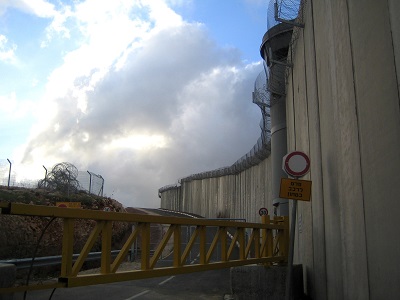
By Tamar Fleishman
We usually prefer to exit Palestine using Hizme checkpoint, where unlike other exit checkpoints, there are no long lines of cars, we aren’t detained and there is no need for identification or getting out of the vehicle to open and present the content of the trunk. You merely slow down by the soldier and answer a generic question like “how is it going?” with an “OK”. Sometimes even that isn’t required, just nod your head and that’s it, you can drive on.
But it’s different for us than for those who don’t pass the test examining the visage and accent of the driver. They, Palestinians from east Jerusalem, in spite of being permanent residents who have the right for freedom of movement (unlike their brothers who reside in the West Bank), are forced to stop, park their vehicle by the soldier’s post on the side of the road, identify themselves, exit the car and open the trunk so the solider can see inside.
Their right to freedom of movement is relative and they are subjected to the mercy and whims of the men in uniform.
The individual’s story is testimony to the story of the general public. The individual in this case was A who after visiting his family intended to drive through Hizme on his way back, with him were his wife, his baby son and someone he knew that said to him: “could you do me a favor, I need to get to Jerusalem, could I ride with you?”- So he did. A didn’t give him a thorough inspection, and had no idea what color his ID was and what was his address. He was just doing someone a favor. But the soldier at the checkpoint did perform an inspection and found out that A was giving a lift to someone who wasn’t permitted to pass through a checkpoint intended only for settlers, like Hizme checkpoint.
The man was arrested and taken away.
A was told to turn his engine off and to stay in the vehicle, in addition they took his car keys.
A, his wife and their child sat and waited. But the baby, who had yet to learn that a soldier’s order must be obeyed, began crying and wailing. The minutes that passed were long and the crying only grew stronger. But they couldn’t step out of the car, they couldn’t take the baby out of his booster, and he couldn’t be cradled in his mother’s arms. A tried getting out to reason with them, but was told to: “stay in the car!” and so he got back in.
After an hour his car keys were handed back to him and his wife and child were sent back home, while A was taken to the police station. There he waited for another hour, until he was given a summons to return on the next day.
Ever since he has been going back and forth to the police station, each day he waits for his name to be called, then he is taken into a room, the piece of paper he was handed on the previous day is taken from him and in return he is given a new paper summoning him to come back on the next day.
The time, the agitation, not to mention the money- all these are of no importance and are not taken into account.
Once he dared to ask why they weren’t handling his case and a policeman said to him: “I don’t have time for you, I’ve got lots of work”- “But my case is part of your work”, replied A, but instead of an answer he got a piece of paper in exchange for the one given to him on the previous day.
Yes, he will be back tomorrow, and perhaps even on the day after that.
This is how the representatives of the authority, who have unlimited power in their hands, handle people, whose rights are conditioned by circumstances.
(Translated by Ruth Fleishman)
– As a member of Machsomwatch, once a week Tamar Fleishman heads out to document the checkpoints between Jerusalem and Ramallah. This documentation (reports, photos and videos) can be found on the organization’s site: www.machsomwatch.org. The majority of the Spotlights (an opinion page) that are published on the site had been written by her. She is also a member of the Coalition of Women for Peace and volunteer in Breaking the Silence. She contributed this article to PalestineChronicle.com.




